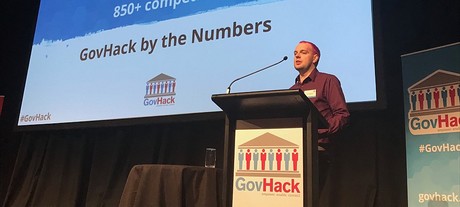GovHack 2018 winners announced

A 3D VR emergency management system and a visualisation of the federal budget are just two of the many projects developed at GovHack 2018.
The organisers of GovHack 2018 have announced the winners of the intense 46-hour hackathon that took place in September. The event saw teams competing to develop prototype products and services, as well as solutions to various problems faced by government departments.
Included in the competition were bounties offered by the ATO, the DTA, the CSIRO’s Data61, IP Australia, the Queensland Government and several federal government ministries. The event also had three corporate sponsors — Infosys, people and payroll solutions provider Aurion and cloud-based analytical data warehousing provider Zetaris.
Several bounties and categories were focused on furthering the government’s overarching goal of ushering in the era of open data and analytics-based decision-making.
Data61 indeed offered a bounty with the mission statement of “making data more open”. The winning project was A+ Search, a series of improvements to search.gov.au adding features including auto completion of keywords and dynamic results to provide relevant documents as a user is still typing in keywords.
Honorable mentions went to Data88, another search-based project, as well as Correlation Explorer, a website designed to allow users to find trends between different data variables from open data.
The Department of Finance sponsored a category and offered a bounty based on data visualisation. The winning project was People’s Budget, a visualisation representing the budget based on tax money flowing into the government.
The winner of the bounty was GovCMS Data Visualisation, a project that explored using the Drupal 8 GovCMS and Data Visualisation Framework (DVF) module, hosted on Microsoft Azure, to represent government data using various graphs.
CouncilPlus meanwhile aims to provide an open source dataset to help councils identify gaps in service in local government areas and take action to close these gaps.
Other notable data-related projects recognised with awards during the competition include five separate projects to identify the bankrupt Australians who are most at risk of non-compliance with their obligations, as well as an interactive dashboard designed to help governments decide where to invest in road safety upgrades based on crash-related data.
Other GovHack 2018 winning projects revolved around prototyping new and innovative government services. Notable examples include Izzy, a chatbot designed to refer citizens to the government services they may need to access based on their unique personal circumstances.
Another chatbot prototype used data pooled from NSW Health and the data.nsw.gov.au portal to help people facing medical emergencies find the hospitals where they are likely to spend the least amount of time waiting to be treated.
A notable project developed for the Department of Industry, Innovation and Science sought to make it easier for business owners to identify the best place to start a new business. At the same time, the system would generate data for the government to use to identify areas with the lowest business growth in the country, and use an AI engine to suggest city improvements that would attract more businesses to the area.
Likewise, a number of projects developed for the ATO were based around the concept of allowing taxpayers to easily identify the nearest ATO help centre, while allowing the agency to place new help centres where they are most needed.
Several projects were based around the theme of identity management and authentication. Examples include myCard, a one-stop solution for managing all a user’s Commonwealth cards — such as the MyKi public transport payment card in use in Victoria — in a single virtual wallet that can be accessed through a phone or NFC card.
OneGov ID is a web app designed to allow users and government agencies to interact with a number of different digital services including accessing vehicle, land title, patent and business data through a single portal. The app is secured using technologies including blockchain.
Meanwhile, three winning projects developed for the Department of Defence were aimed at improving emergency management capabilities.
Virtual Emergency Management involved developing a 3D virtual reality emergency management experience that maps out all the information an emergency commander will need to best direct emergency response resources.
Emergency Data Response is based on a proposed device that would host emergency data related to a local data site, based on a whole-of-government web crawl, and then act as a de facto local internet in emergency situations where no internet connectivity is available.
Finally, Safer Evacuations aimed to help first responders model evacuation situations in urban environments and plan the ideal escape routes.
There were also two projects designed to encourage urban dwellers to move to regional areas by using government data to present compelling reasons to move to specific towns and suburbs.
As well as the projects themselves, awards were handed out to the government departments — as well as the states or territories and local councils — that had the best government participation in the event.
The winner in the Australian government category was the Australian Financial Security Authority, while the ATO was named the runner-up. In the state or territory category, Queensland was the winner, followed by the ACT. In the local council category, the City of Casey took home the gold, while Sunshine Coast Council was the runner-up, and an honorable mention went to the City of Albany.
Please follow us and share on Twitter and Facebook. You can also subscribe for FREE to our weekly newsletter and quarterly magazine.
Interview: Phil Zammit, Avaya
For our summer Leaders in Technology series we are discussing AI, system complexity, skills and...
From training to collaboration: how XR can transform public sector operations
Extended reality (XR) has emerged in recent years as a powerful tool for public service...
How financial automation bridges the public sector resource gap
The growing resources gap in finance and technology is a key challenge in the public sector.



